- Home
- Gillian Flynn
Gone Girl: A Novel Page 4
Gone Girl: A Novel Read online
Page 4
The book party was as schizophrenic as the book—at Bluenight, off Union Square, one of those shadowy salons with wingback chairs and art deco mirrors that are supposed to make you feel like a Bright Young Thing. Gin martinis wobbling on trays lofted by waiters with rictus smiles. Greedy journalists with knowing smirks and hollow legs, getting the free buzz before they go somewhere better.
My parents circulate the room hand in hand—their love story is always part of the Amazing Amy story: husband and wife in mutual creative labor for a quarter century. Soul mates. They really call themselves that, which makes sense, because I guess they are. I can vouch for it, having studied them, little lonely only child, for many years. They have no harsh edges with each other, no spiny conflicts, they ride through life like conjoined jellyfish—expanding and contracting instinctively, filling each other’s spaces liquidly. Making it look easy, the soul-mate thing. People say children from broken homes have it hard, but the children of charmed marriages have their own particular challenges.
Naturally, I have to sit on some velvety banquette in the corner of the room, out of the noise, so I can give a few interviews to a sad handful of kid interns who’ve gotten stuck with the “grab a quote” assignment from their editors.
How does it feel to see Amy finally married to Andy? Because you’re not married, right?
Question asked by:
a) a sheepish, bug-eyed kid balancing a notebook on top of his messenger bag
b) an overdressed, sleek-haired young thing with fuck-me stilettos
c) an eager, tattooed rockabilly girl who seemed way more interested in Amy than one would guess a tattooed rockabilly girl would be
d) all of the above
Answer: D
Me: “Oh, I’m thrilled for Amy and Andy, I wish them the best. Ha, ha.”
My answers to all the other questions, in no particular order:
“Some parts of Amy are inspired by me, and some are just fiction.”
“I’m happily single right now, no Able Andy in my life!”
“No, I don’t think Amy oversimplifies the male-female dynamic.”
“No, I wouldn’t say Amy is dated; I think the series is a classic.”
“Yes, I am single. No Able Andy in my life right now.”
“Why is Amy amazing and Andy’s just able? Well, don’t you know a lot of powerful, fabulous women who settle for regular guys, Average Joes and Able Andys? No, just kidding, don’t write that.”
“Yes, I am single.”
“Yes, my parents are definitely soul mates.”
“Yes, I would like that for myself one day.”
“Yep, single, motherfucker.”
Same questions over and over, and me trying to pretend they’re thought-provoking. And them trying to pretend they’re thought-provoking. Thank God for the open bar.
Then no one else wants to talk to me—that fast—and the PR girl pretends it’s a good thing: Now you can get back to your party! I wriggle back into the (small) crowd, where my parents are in full hosting mode, their faces flushed—Rand with his toothy prehistoric-monster-fish smile, Marybeth with her chickeny, cheerful head bobs, their hands intertwined, making each other laugh, enjoying each other, thrilled with each other—and I think, I am so fucking lonely.
I go home and cry for a while. I am almost thirty-two. That’s not old, especially not in New York, but fact is, it’s been years since I even really liked someone. So how likely is it I’ll meet someone I love, much less someone I love enough to marry? I’m tired of not knowing who I’ll be with, or if I’ll be with anyone.
I have many friends who are married—not many who are happily married, but many married friends. The few happy ones are like my parents: They’re baffled by my singleness. A smart, pretty, nice girl like me, a girl with so many interests and enthusiasms, a cool job, a loving family. And let’s say it: money. They knit their eyebrows and pretend to think of men they can set me up with, but we all know there’s no one left, no one good left, and I know that they secretly think there’s something wrong with me, something hidden away that makes me unsatisfiable, unsatisfying.
The ones who are not soul-mated—the ones who have settled—are even more dismissive of my singleness: It’s not that hard to find someone to marry, they say. No relationship is perfect, they say—they, who make do with dutiful sex and gassy bedtime rituals, who settle for TV as conversation, who believe that husbandly capitulation—yes, honey, okay, honey—is the same as concord. He’s doing what you tell him to do because he doesn’t care enough to argue, I think. Your petty demands simply make him feel superior, or resentful, and someday he will fuck his pretty, young coworker who asks nothing of him, and you will actually be shocked. Give me a man with a little fight in him, a man who calls me on my bullshit. (But who also kind of likes my bullshit.) And yet: Don’t land me in one of those relationships where we’re always pecking at each other, disguising insults as jokes, rolling our eyes and “playfully” scrapping in front of our friends, hoping to lure them to our side of an argument they could not care less about. Those awful if only relationships: This marriage would be great if only … and you sense the if only list is a lot longer than either of them realizes.
So I know I am right not to settle, but it doesn’t make me feel better as my friends pair off and I stay home on Friday night with a bottle of wine and make myself an extravagant meal and tell myself, This is perfect, as if I’m the one dating me. As I go to endless rounds of parties and bar nights, perfumed and sprayed and hopeful, rotating myself around the room like some dubious dessert. I go on dates with men who are nice and good-looking and smart—perfect-on-paper men who make me feel like I’m in a foreign land, trying to explain myself, trying to make myself known. Because isn’t that the point of every relationship: to be known by someone else, to be understood? He gets me. She gets me. Isn’t that the simple magic phrase?
So you suffer through the night with the perfect-on-paper man—the stutter of jokes misunderstood, the witty remarks lobbed and missed. Or maybe he understands that you’ve made a witty remark but, unsure of what to do with it, he holds it in his hand like some bit of conversational phlegm he will wipe away later. You spend another hour trying to find each other, to recognize each other, and you drink a little too much and try a little too hard. And you go home to a cold bed and think, That was fine. And your life is a long line of fine.
And then you run into Nick Dunne on Seventh Avenue as you’re buying diced cantaloupe, and pow, you are known, you are recognized, the both of you. You both find the exact same things worth remembering. (Just one olive, though.) You have the same rhythm. Click. You just know each other. All of a sudden you see reading in bed and waffles on Sunday and laughing at nothing and his mouth on yours. And it’s so far beyond fine that you know you can never go back to fine. That fast. You think: Oh, here is the rest of my life. It’s finally arrived.
NICK DUNNE
THE DAY OF
I waited for the police first in the kitchen, but the acrid smell of the burnt teakettle was curling up in the back of my throat, underscoring my need to retch, so I drifted out on the front porch, sat on the top stair, and willed myself to be calm. I kept trying Amy’s cell, and it kept going to voice mail, that quick-clip cadence swearing she’d phone right back. Amy always phoned right back. It had been three hours, and I’d left five messages, and Amy had not phoned back.
I didn’t expect her to. I’d tell the police: Amy would never have left the house with the teakettle on. Or the door open. Or anything waiting to be ironed. The woman got shit done, and she was not one to abandon a project (say, her fixer-upper husband, for instance), even if she decided she didn’t like it. She’d made a grim figure on the Fiji beach during our two-week honeymoon, battling her way through a million mystical pages of The Wind-Up Bird Chronicle, casting pissy glances at me as I devoured thriller after thriller. Since our move back to Missouri, the loss of her job, her life had revolved (devolved?) around the completion
of endless tiny, inconsequential projects. The dress would have been ironed.
And there was the living room, signs pointing to a struggle. I already knew Amy wasn’t phoning back. I wanted the next part to start.
It was the best time of day, the July sky cloudless, the slowly setting sun a spotlight on the east, turning everything golden and lush, a Flemish painting. The police rolled up. It felt casual, me sitting on the steps, an evening bird singing in the tree, these two cops getting out of their car at a leisurely pace, as if they were dropping by a neighborhood picnic. Kid cops, mid-twenties, confident and uninspired, accustomed to soothing worried parents of curfew-busting teens. A Hispanic girl, her hair in a long dark braid, and a black guy with a marine’s stance. Carthage had become a bit (a very tiny bit) less Caucasian while I was away, but it was still so severely segregated that the only people of color I saw in my daily routine tended to be occupational roamers: delivery men, medics, postal workers. Cops. (“This place is so white, it’s disturbing,” said Amy, who, back in the melting pot of Manhattan, counted a single African-American among her friends. I accused her of craving ethnic window dressing, minorities as backdrops. It did not go well.)
“Mr. Dunne? I’m Officer Velásquez,” said the woman, “and this is Officer Riordan. We understand you’re concerned about your wife?”
Riordan looked down the road, sucking on a piece of candy. I could see his eyes follow a darting bird out over the river. Then he snapped his gaze back toward me, his curled lips telling me he saw what everyone else did. I have a face you want to punch: I’m a working-class Irish kid trapped in the body of a total trust-fund douchebag. I smile a lot to make up for my face, but this only sometimes works. In college, I even wore glasses for a bit, fake spectacles with clear lenses that I thought would lend me an affable, unthreatening vibe. “You do realize that makes you even more of a dick?” Go reasoned. I threw them out and smiled harder.
I waved in the cops: “Come inside the house and see.”
The two climbed the steps, accompanied by the squeaking and shuffling noises of their belts and guns. I stood in the entry to the living room and pointed at the destruction.
“Oh,” said Officer Riordan, and gave a brisk crack of his knuckles. He suddenly looked less bored.
Riordan and Velásquez leaned forward in their seats at the dining room table as they asked me all the initial questions: who, where, how long. Their ears were literally pricked. A call had been made out of my hearing, and Riordan informed me that detectives were being dispatched. I had the grave pride of being taken seriously.
Riordan was asking me for the second time if I’d seen any strangers in the neighborhood lately, was reminding me for the third time about Carthage’s roving bands of homeless men, when the phone rang. I launched myself across the room and grabbed it.
A surly woman’s voice: “Mr. Dunne, this is Comfort Hill Assisted Living.” It was where Go and I boarded our Alzheimer’s-riddled father.
“I can’t talk right now, I’ll call you back,” I snapped, and hung up. I despised the women who staffed Comfort Hill: unsmiling, uncomforting. Underpaid, gruelingly underpaid, which was probably why they never smiled or comforted. I knew my anger toward them was misdirected—it absolutely infuriated me that my father lingered on while my mom was in the ground.
It was Go’s turn to send the check. I was pretty sure it was Go’s turn for July. And I’m sure she was positive it was mine. We’d done this before. Go said we must be mutually subliminally forgetting to mail those checks, that what we really wanted to forget was our dad.
I was telling Riordan about the strange man I’d seen in our neighbor’s vacated house when the doorbell rang. The doorbell rang. It sounded so normal, like I was expecting a pizza.
The two detectives entered with end-of-shift weariness. The man was rangy and thin, with a face that tapered severely into a dribble of a chin. The woman was surprisingly ugly—brazenly, beyond the scope of everyday ugly: tiny round eyes set tight as buttons, a long twist of a nose, skin spackled with tiny bumps, long lank hair the color of a dust bunny. I have an affinity for ugly women. I was raised by a trio of women who were hard on the eyes—my grandmother, my mom, her sister—and they were all smart and kind and funny and sturdy, good, good women. Amy was the first pretty girl I ever dated, really dated.
The ugly woman spoke first, an echo of Miss Officer Velásquez. “Mr. Dunne? I’m Detective Rhonda Boney. This is my partner, Detective Jim Gilpin. We understand there are some concerns about your wife.”
My stomach growled loud enough for us all to hear it, but we pretended we didn’t.
“We take a look around, sir?” Gilpin said. He had fleshy bags under his eyes and scraggly white whiskers in his mustache. His shirt wasn’t wrinkled, but he wore it like it was; he looked like he should stink of cigarettes and sour coffee, even though he didn’t. He smelled like Dial soap.
I led them a few short steps to the living room, pointed once again at the wreckage, where the two younger cops were kneeling carefully, as if waiting to be discovered doing something useful. Boney steered me toward a chair in the dining room, away from but in view of the signs of struggle.
Rhonda Boney walked me through the same basics I’d told Velásquez and Riordan, her attentive sparrow eyes on me. Gilpin squatted down on a knee, assessing the living room.
“Have you phoned friends or family, people your wife might be with?” Rhonda Boney asked.
“I … No. Not yet. I guess I was waiting for you all.”
“Ah.” She smiled. “Let me guess: baby of the family.”
“What?”
“You’re the baby.”
“I have a twin sister.” I sensed some internal judgment being made. “Why?” Amy’s favorite vase was lying on the floor, intact, bumped up against the wall. It was a wedding present, a Japanese masterwork that Amy put away each week when our housecleaner came because she was sure it would get smashed.
“Just a guess of mine, why you’d wait for us: You’re used to someone else always taking the lead,” Boney said. “That’s what my little brother is like. It’s a birth-order thing.” She scribbled something on a notepad.
“Okay.” I gave an angry shrug. “Do you need my sun sign too, or can we get started?”
Boney smiled at me kindly, waiting.
“I waited to do something because, I mean, she’s obviously not with a friend,” I said, pointing at the disarray in the living room.
“You’ve lived here, what, Mr. Dunne, two years?” she asked.
“Two years September.”
“Moved from where?”
“New York.”
“City?”
“Yes.”
She pointed upstairs, asking permission without asking, and I nodded and followed her, Gilpin following me.
“I was a writer there,” I blurted out before I could stop myself. Even now, two years back here, and I couldn’t bear for someone to think this was my only life.
Boney: “Sounds impressive.”
Gilpin: “Of what?”
I timed my answer to my stair climbing: I wrote for a magazine (step), I wrote about pop culture (step) for a men’s magazine (step). At the top of the stairs, I turned to see Gilpin looking back at the living room. He snapped to.
“Pop culture?” he called up as he began climbing. “What exactly does that entail?”
“Popular culture,” I said. We reached the top of the stairs, Boney waiting for us. “Movies, TV, music, but, uh, you know, not high arts, nothing hifalutin.” I winced: hifalutin? How patronizing. You two bumpkins probably need me to translate my English, Comma, Educated East Coast into English, Comma, Midwest Folksy. Me do sum scribbling of stuffs I get in my noggin after watchin’ them movin’ pitchers!
“She loves movies,” Gilpin said, gesturing toward Boney. Boney nodded: I do.
“Now I own The Bar, downtown,” I added. I taught a class at the junior college too, but to add that suddenly felt too needy. I wasn�
��t on a date.
Boney was peering into the bathroom, halting me and Gilpin in the hallway. “The Bar?” she said. “I know the place. Been meaning to drop by. Love the name. Very meta.”
“Sounds like a smart move,” Gilpin said. Boney made for the bedroom, and we followed. “A life surrounded by beer ain’t too bad.”
“Sometimes the answer is at the bottom of a bottle,” I said, then winced again at the inappropriateness.
We entered the bedroom.
Gilpin laughed. “Don’t I know that feeling.”
“See how the iron is still on?” I began.
Boney nodded, opened the door of our roomy closet, and walked inside, flipping on the light, fluttering her latexed hands over shirts and dresses as she moved toward the back. She made a sudden noise, bent down, turned around—holding a perfectly square box covered in elaborate silver wrapping.
My stomach seized.
“Someone’s birthday?” she asked.
“It’s our anniversary.”
Boney and Gilpin both twitched like spiders and pretended they didn’t.
By the time we returned to the living room, the kid officers were gone. Gilpin got down on his knees, eyeing the overturned ottoman.
“Uh, I’m a little freaked out, obviously,” I started.
“I don’t blame you at all, Nick,” Gilpin said earnestly. He had pale blue eyes that jittered in place, an unnerving tic.
“Can we do something? To find my wife. I mean, because she’s clearly not here.”
Boney pointed at the wedding portrait on the wall: me in my tux, a block of teeth frozen on my face, my arms curved formally around Amy’s waist; Amy, her blond hair tightly coiled and sprayed, her veil blowing in the beach breeze of Cape Cod, her eyes open too wide because she always blinked at the last minute and she was trying so hard not to blink. The day after Independence Day, the sulfur from the fireworks mingling with the ocean salt—summer.

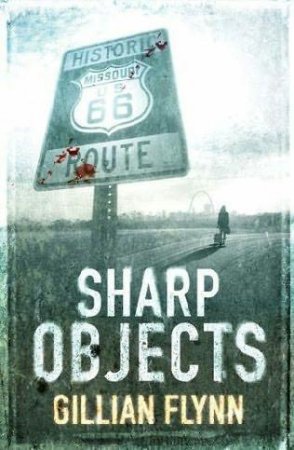 Sharp Objects
Sharp Objects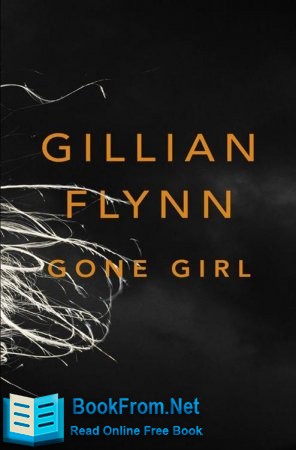 Gone Girl
Gone Girl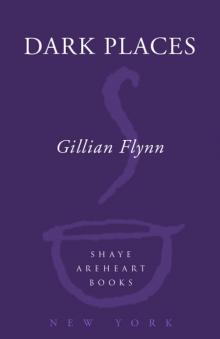 Dark Places
Dark Places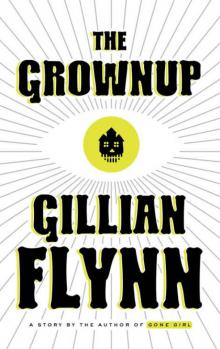 The Grownup
The Grownup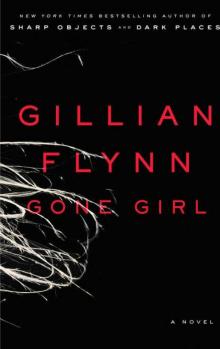 Gone Girl: A Novel
Gone Girl: A Novel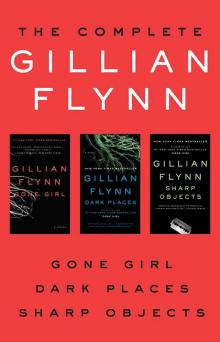 The Complete Gillian Flynn
The Complete Gillian Flynn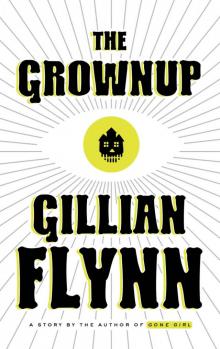 The Grownup: A Story by the Author of Gone Girl (Kindle Single)
The Grownup: A Story by the Author of Gone Girl (Kindle Single)